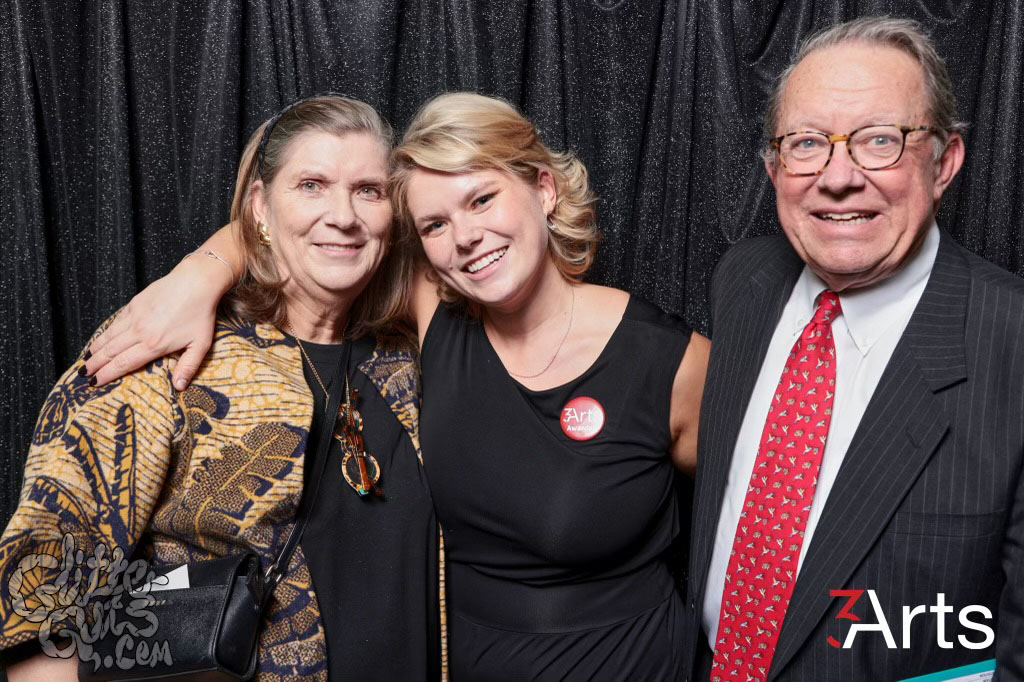Columbia Grad Charlotte “Chuck” Gruman ’19 Awarded $30,000 Grant From 3Arts
 Image via 3Arts | Charlotte Gruman at the 2023 3Arts Awards with her parents Mary and Jep Gruman
Image via 3Arts | Charlotte Gruman at the 2023 3Arts Awards with her parents Mary and Jep Gruman As a graduate of Columbia’s Business and Entrepreneurship program, Gruman works as an accessibility consultant and runs her own business, Windy City Accessibility. She helps bridge the gap between performance and cultural spaces and the diverse communities that experience them. Gruman uses the term “cultural accessibility” to describe the necessary resources that cultural spaces such as museums, theaters and concert venues can provide to visitors seeking stimulating yet comfortable audience experiences.
Gruman identifies as neurodivergent, and from an early age sought medical and social interventions to help with her sensory processing disorder and attention-deficit hyperactivity disorder (ADHD). According to Harvard Health, the word neurodiversity refers to the diversity of all people, but it is often used in the context of autism spectrum disorder (ASD), as well as other neurological or developmental conditions such as ADHD or learning disabilities.
What some may perceive as a barrier, Chuck sees as a calling to help people with similar processing issues experience arts and culture in a sensory-friendly way.
Cognitive behavioral therapy and handwriting therapy helped Gruman navigate the early developmental challenges she faced. As an adult, Gruman knew she wanted to pay it forward and help educate business owners on the best accessibility practices for people who not only have physical disabilities, but cognitive differences as well.
“My parents and family worked to make accommodations to help me achieve the most balanced life they could provide. They never shamed me for the way that my brain worked; on the contrary, they supported my differences and worked hard to make me feel balanced, and celebrated the things that made me different.”
At Columbia, Gruman studied box office management within the International Arts Management program. Gruman credits the creative spaces at Columbia for helping her study in the learning environment that worked best for her. Specifically, the “graffiti room” in The Dwight dorm helped her release creative energy late at night when she felt her most productive. Columbia’s creative spaces influenced the way Gruman conceptualized her consulting business once she graduated.
“That was something cool I noticed about Columbia. I wasn’t the only one up all night in the dorms doing homework or working on creative projects,” says Gruman. “I would find myself in the graffiti room at night at the same time as other students and I felt that brought us together.”
Life after graduation from Columbia College Chicago
Gruman landed her first job at the Museum of Contemporary Art working on the Virgil Abloh exhibit and then later transitioned to box office work at the renowned Steppenwolf Theatre Company in Chicago.
“Getting a job at Steppenwolf doing box office work, which is what I went to school for, was really exciting because it’s a theater I admire and a lot of people are brought together by the community of Steppenwolf,” says Gruman.
Gruman first experienced the 3Arts Awards while working as an events manager for the ceremony at the Museum of Contemporary Art pre-Covid. Now, Gruman says she feels lucky to be one of the grant recipients for 3Arts, which supports women artists, artists of color, and Deaf and disabled artists.
“I didn’t expect to be a winner. I was so grateful to be nominated but I didn’t really plan on what to do with this very generous gift,” says Gruman. “I’m going to hopefully continue providing my services to people who can’t necessarily afford it and because of this grant I have the flexibility to do that.”
Gruman says she will use the 3Arts grant to help her work with small businesses with financial barriers that might prevent them from investing in sensory-friendly spaces. The grant money helped her purchase multiple 3D printers and a laser cutter to make tactile models of theaters, museums, libraries, and other cultural centers for anyone to use as a wayfinding tool. Braille and large-print versions of written materials as well as video captioning are just a few examples of accessibility accommodations that Gruman wants to expand. She also sews weighted blankets and toys that can offer a calming feeling to visitors, as well as designing quiet or sensory-friendly spaces.
Gruman continues to work part-time at the Steppenwolf Theatre Company as she builds her business in Chicago. She hopes her work will inspire organizations to design more accessible spaces and rethink how they engage with the community, especially those who receive and process art differently from mainstream expectations.
Recent News
- Grace Kessler Overbeke to Present The Many Mrs Maisels 20th Century US Jewish Female StandUp Comedians
- ASL Conference Brings High School and College Students Together at Columbia College Chicago
- What to Watch and Where to Wander This Winter: Columbia Edition
- Five Columbia Students Earn Prestigious Fashion Scholarships
- Columbia and the Chicago Fashion Incubator Announce New Partnership